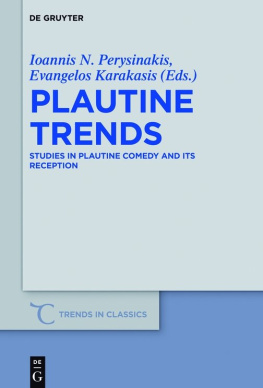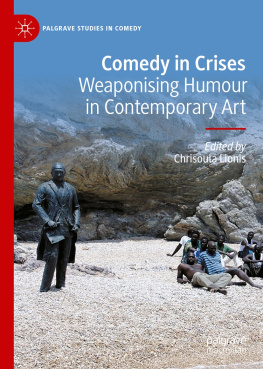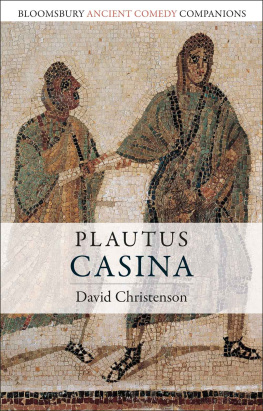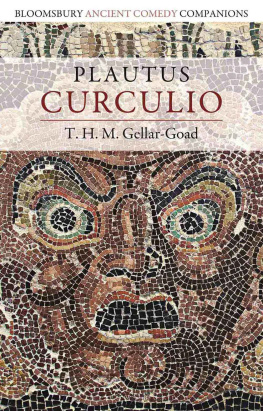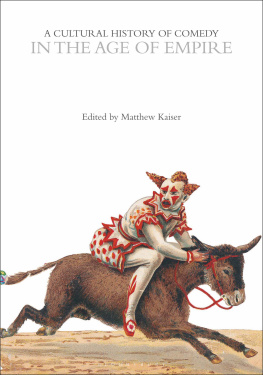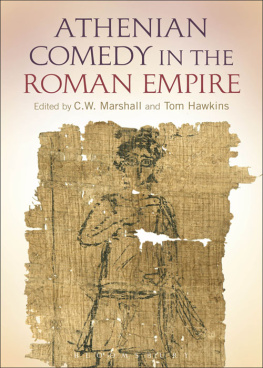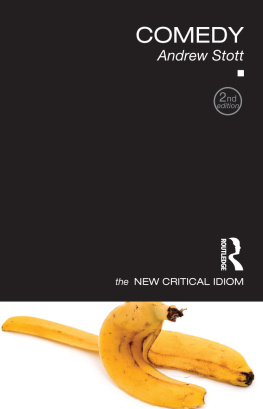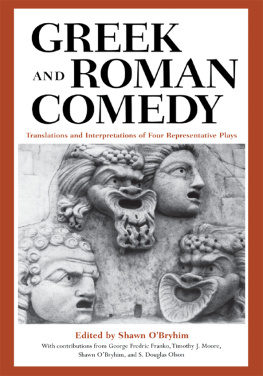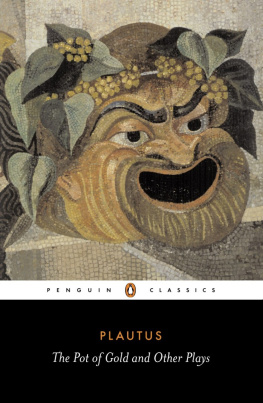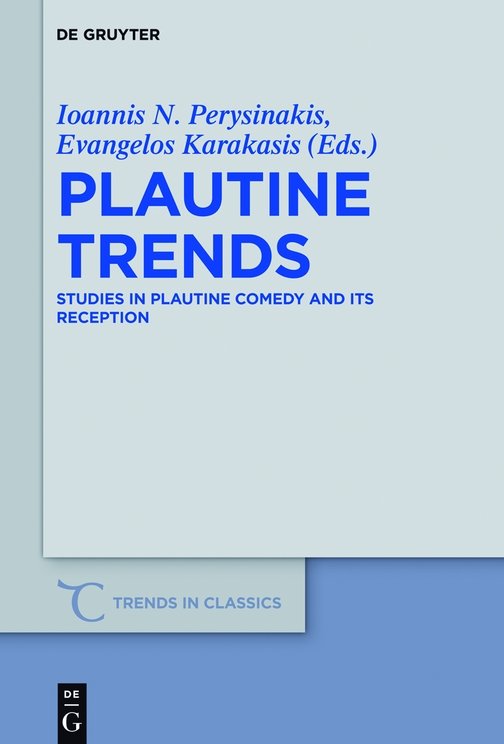List of Contributors
Antony Augoustakis is Associate Professor of Classics at the University of Illinois (Urbana-Champaign, Illinois, USA). He is the author of Motherhood and the Other: Fashioning Female Power in Flavian Epic (Oxford, 2010) and Plautus Mercator (Bryn Mawr, 2009). He has edited the Brill Companion to Silius Italicus (Leiden, 2010), Ritual and Religion in Flavian Epic (Oxford, 2013), a volume of Flavian Poetry and its Greek Past (Leiden, 2014), and coedited with Carole Newlands Statius Siluae and the Poetics of Intimacy (Arethusa, 2007) and with Ariana Traill the Blackwell Companion to Terence (Malden, Mass., 2013). He is working on a commentary on Statius Thebaid Book 8 (Oxford, 2015) and the Oxford Readings in Flavian Epic, coedited with Helen Lovatt (Oxford, 2015).
Ruth Caston is Associate Professor of Classics at the University of Michigan. Her work centres on Augustan poetry, especially Roman love elegy and satire, and Republican drama, with a special interest in ancient theories of the passions. She has published on Roman love elegy (The Elegiac Passion: Jealousy in Roman Love Elegy, Oxford 2012) and is currently working on a new book on Terence.
David Christenson is Professor of Classics at the University of Arizona, where he has won multiple awards for mentoring and teaching. He is the author of an edition with commentary of Plautus Amphitruo (Cambridge, 2000), and is currently working on a new edition of Plautus Pseudolus for the Cambridge Greek and Latin Classics series. He has published two volumes of translations, Roman Comedy: Five Plays by Plautus and Terence (2010) and Four Plays by Plautus: Casina, Amphitryon, Captivi, Pseudolus (2008), both with Focus Publishing. His collection of translations, Four Ancient Comedies about Women: Aristophanes Lysistrata, Menanders Samia, Plautus Casina, Terences Hecyra is forthcoming from Oxford University Press. He is also preparing a study of Roman comedy for I.B. Tauris Understanding Classics series. He was a Loeb Classical Library Foundation Fellow in 201112.
Michael Fontaine is an Associate Professor of Classics and Associate Dean of the Faculty at Cornell University (Ithaca, New York, USA). He is the author of Funny Words in Plautine Comedy (Oxford University Press, 2010) and wrote the chapters on Plautus and Terence for The Oxford Handbook of Greek and Roman Comedy, which he has coedited with Adele Scafuro (2014). He is now completing an edition and translation of Joannes Burmeisters NeoLatin Aulularia and fragmentary MaterVirgo for De Gruyter Verlag (Berlin).
Stavros Frangoulidis is Professor of Latin at the Aristotle University of Thessaloniki. He has co-organised several RICAN conferences on the study of the Ancient Novel, and co-edited the proceedings thereof (published as Ancient Narrative Supplementa). He has edited a thematic issue on the ancient novel (with Stephen J. Harrison), and a volume on Latin genre (with Theodore D. Papanghelis and Stephen J. Harrison), both published in the Trends in Classics series (Walter de Gruyter). He has written a number of articles on Roman comedy, the Latin novel and Senecan tragedy. Finally, he is the author of the following books: Handlung und Nebenhandlung: Theater, Metatheater und Gattungsbewusstein in der rmischen Komdie (Stuttgart: J.B. Metzler, 1997); Roles and Performances in Apuleius Metamorphoses (Stuttgart: J.B. Metzler, 2001); and Witches, Isis and Narrtive: Approaches to Magic in Apuleius Metamorphoses (Berlin and New York: Walter de Gruyter, 2008).
Mathias Hanses (Columbia University in the City of New York) works on the life of comedy after the death of Plautus. He he has published on creative appropriations of Roman comedy in the first centuries BCE and CE, Aratus acrostics, political bias in Roman historiography, and classical receptions in the US and Europe.
Evangelos Karakasis studied Classics at the University of Ioannina, Greece (BA, 1995) and Pembroke College, University of Cambridge (MPhil, 1997; PhD, 2001) and taught Latin Language and Literature at the Aristotle University of Thessaloniki (Lecturer in Latin 2004 11); at present he is Assistant Professor of Latin at the University of Ioannina. He is the author of Terence and the Language of Roman Comedy, Cambridge 2005 (hardback), 2008 (paperback); SongExchange in Roman Pastoral, Berlin 2011; and of various papers on Roman comedy, elegy, pastoral, epic and novel. He is also the editor of the Trends in Classics Special Issue (4.1) with the title: Singing in the Shadow Pastoral Encounters in PostVer-gilian Poetry. He is currently completing a monograph on Neronian Pastoral.
David Konstan is Professor of Classics at New York University and Professor Emeritus of Classics and Comparative Literature at New York University. Among his books are Roman Comedy (1983); Sexual Symmetry: Love in the Ancient Novel and Related Genres (1994); Greek Comedy and Ideology (1995); Friendship in the Classical World (1997); Pity Transformed (2001); The Emotions of the Ancient Greeks: Studies in Aristotle and Classical Literature (2006); A Life Worthy of the Gods: The Materialist Pyschology of Epicurus (2008); and Before Forgiveness: The Origins of a Moral Idea (2010). He is currently working on studies of beauty and remorse. He is a past president of the American Philological Association, and a Fellow of the American Academy of Arts and Sciences and Honorary Fellow of the Australian Academy of the Humanities.
Sophia Papaioannou (PhD University of Texas at Austin) is Associate Professor of Latin Literature at the National and Kapodistrian University of Athens. Her main research interests are the Literature of the Age of Augustus, Ancient Epic and Roman Comedy. She has published Epic Succession and Dissension: Ovid, Metamorphoses 13.62314.582, and the Reinvention of the Aeneid (2005); Redesigning Achilles: The Recycling of the Epic Cycle in Ovid, Metamorphoses 12.1 13.620 (2007); Plautus, Miles Gloriosus. Introduction, Translation and Commentary [in Greek] (2009), the first annotated edition of Plautus play since 1963, and the first translation of the play in Greek; and (with A.K. Petrides) New Perspectives on Postclassical Comedy (2010). Her most recent book, a collective volume of interpretive essays on Terence and the reception of Terence, entitled Terence Interpreting / Interpreting Terence, is to be published by Cambridge Scholars Publishing in 2014.
Katerina Philippides is a Lecturer in the Department of Theatre Studies at the University of Patras. Her dissertation is on Repeated Scenes in Plautus Comedies (University of Crete, 2008). Her research interests include Hellenistic and Roman comedy and tragedy approached mainly from a dramatological point of view. She has published several articles on the Roman playwrights Plautus and Terence, but also on Ovid, Archilochus and Pindar.
Alison Sharrock is Professor of Classics at the University of Manchester. After starting out with Ovid, elegy, and literary theory, she turned to Roman comedy, and in 2009 published Reading Roman Comedy: Poetics and Playfulness in Plautus and Terence (Cambridge). She is now returning to Ovid, working on a book on Ovid and Epic.
Niall Slater (Samuel Candler Dobbs Professor of Latin and Greek, Emory University) focuses on the ancient theatre and its production conditions, prose fiction, and popular reception of classical literature. His books include Spectator Politics: Metatheatre and Performance in Aristophanes (Penn 2002); Reading Petronius (JHUP, 1990); and Plautus in Performance: The Theatre of the Mind (Princeton, 1985; 2nd, revised edition 2000), as well as translations of Middle Comedy for The Birth of Comedy (ed. J. R. Rusten, JHUP, 2011) and the Bloomsbury Companion to Euripides Alcestis (2013). Current work includes studies of Harley Granville Barkers 1915 American tour with productions of Trojan Women and Iphigenia in Tauris as well as classical memories in C. S. Lewiss childrens books.

